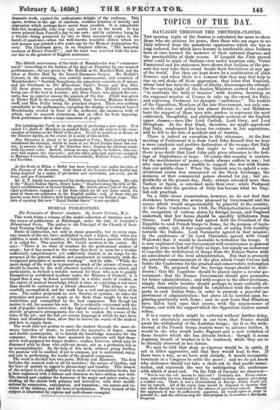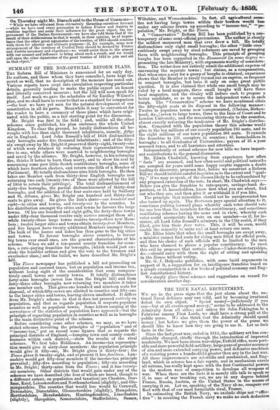TOPICS OF THE DAY.
DAYLIGHT THROUGH THE THUNDER-CLOUDS.
Taz opening night of the Session is calculated far more to cheer those who are anxious for peace, than those who are eager to see Italy relieved from the monstrous oppressions which she has so long endured, but which have become so intolerable since Italians have at once learned the measure of their national disgrace and the practicability of their rescue. If Leopold the First proved what could be made of Italians even under Austrian rule' Victor Emmanuel and his statesmen have shown that Italians of the pre- sent day may take their stand beside their forefathers at any age of the world. But they are kept down by a combination of alien Powers; and when there is a rumour that they may find help to rise up and shake off their oppression they learn that England, whose land has been the cradle of liberty, discourages the attempt. On the opening night of the Session Ministers avowed the resolve "to maintain the faith of treaties" with Austria, frowning on the supposed mission of France to take up .the sword for Italy, and reproving Piedmont for dynastic "ambitions." The leaders of the Opposition, Members of the late Government, not only con- cur in this tone and policy but almost dictate it; and Ministers have the support of those men who profess to represent the most cultivated, thoughtful, and philanthropic sections of the English upper classes,—men like Lord Carlisle, Lord Grey, and Lord Brougham. At the first blush, therefore, we might apprehend that Italy, condemned for being too extreme in her aspirations, will be left to the fate of accident and of Austria.
There is indeed an exception to this utterance. At the first meeting of Parliament it is from Lord John Russell that we hear a more emphatic and positive declaration of the wrongs that Italy has endured, as wrongs that ought to be redressed. And there is no doubt that Lord John only gives utterance to the feel- ings of Englishmen at large. Of course this country is anxious for the maintenance of peace,—trade always suffers in war ; but who came forward more readily to support the war with Russia than our middle class ? When the Spanish war to uphold a con- stitutional crown was announced on the Stock Exchange, the denizens of that commercial palace shouted for joy ; but un- doubtedly at the present day, Italy, always esteemed more than Turkey or Spain, is esteemed more than ever ; while Piedmont has shown that the question of Italy has become what we Eng- lish call practical.
On a little closer examination, however, we do not find that dissidence between the sours° proposed by Government and the course which would unquestionably be grateful to the country. At the Paris Conference in 1856, the Plenipotentiaries discussed the occupation of various states by foreign troops, and England undertook that her forces should be speedily withdrawn from Greece. Lord Normanby had agreed with the President of the Republic to send French troops to Rome, for the purpose of main- taining order, not, it was expressly said, of acting with hostility towards the Italians. Lord 1sTormanby agreed in that mission; in the conference of '56 Lord Clarendon agreed with Count Walewski that it would be desirable to withdraw the troops. It is now explained that our Government will countenance no general appeal to arms on behalf of Italy at large, but simply an endeavour to expedite the withdrawal of troops from the Roman States with an amendment of the local administration. But that is precisely the practical commencement of the plan which Count Cavour laid before the Conference for the gradual and conservative redemption of Italy. 'He proposed that the foreign troops should be with- drawn; that the Legations should be placed under a secular go- vernment; that the Roman Government should give guarantee for better administration ; and with respect to the other provinces, simply that while treaties should perhaps be more correctly ob- served, communications should be established with the moderate party in each Italian State, in order to promote a peaceful im- provement of administration ; but above all he insisted upon be- g practically with Rome; and we now learn that Ministers have fallen back upon that course, with the acquiescence of France, and with the support which the Opposition leaders cannot refuse.
It is a course which might be enforced without further delay. It is not absolutely necessary in our view, that France should await the withdrawal of the Austrian troops ; for if on the with- drawal of the French troops Austria were to advance further, it
would be she who would makefla t and n new violation of those treaties which she has alreatgrailliroken ; though it seems Austrian breach of treaties is to be condoned, while they are to be literally observed in her favour. We may be told that steps so vigorous would be in spirit, if not in letter aggressive' and that they would lead to war. If
there were a war, as we have said already, it would necessarily terminate in a Congress to settle the peace ; and we do not know why statesmen should not take a short cut to that pacific termi- nation, and supersede the war by anticipating the conference
with which it must end. On the 15th of January we observed- " But is war the sole means to this end ? Certainly not. Every states- man, especially the true friends of Italy, would exclaim against provoking a conflict now. There is not a Government in Europe which would not
lose by tumult. All of the royal class would be disposed to chastise that one which should be convicted of the offence of provoking tumult. Should
the approach of war be sufficiently apparent, all would agree iu steps to prevent it ; and the obvious step for that purpose is, to summon a European Congress. On Thursday night Mr. Disraeli said to the House of Commons— "While we have refrained from obtrusively thrusting ourselves forward —while we have used every persuasion to induce France and Austria to combine together and unite their influence for the great object, the im- provement of the Italian Government—we have also told them that if the result of their deliberations be that it would, in their opinion, be of impor- tance that the other great signatories of the treatise, of 1815 should combine with them for ulterior and ultimate purposes—if, for example, some new arrangement of the territory of Central 'Italy should be deemed by France and Austria necessary and expedient—we would assist them to the utmost with our counsel and influence to bring about such a result, and we would call upon the other signatories of the great treaties of 1815 to join and aid in that object,"



































 Previous page
Previous page